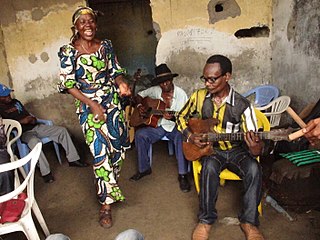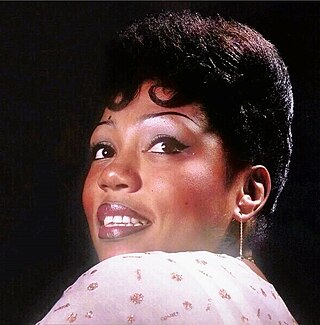
Soukous is a genre of dance music originating from the Democratic Republic of the Congo and the Republic of the Congo. It derived from Congolese rumba in the 1960s, with faster dance rhythms and bright, intricate guitar improvisation, and gained popularity in the 1980s in France. Although often used by journalists as a synonym for Congolese rumba, both the music and dance associated with soukous differ from more traditional rumba, especially in its higher tempo, song structures and longer dance sequences.

African popular music, like African traditional music, is vast and varied. Most contemporary genres of western popular music build on cross-pollination with traditional African American and African popular music. Many genres in popular music of rock, metal, pop, blues, jazz, salsa, zouk, and rumba derive, of varying degrees, musical traditions from Africa cultured to the Americas, by enslaved Africans. These rhythms and sounds have subsequently been adapted by newer genres like hip-hop, and R&B. Likewise, African popular music have adopted Western music industry recording studio techniques. The term does not refer to a specific style or sound but is used as a general term for African popular music.
Marie-Claire Mboyo Moseka, known professionally as M'bilia Bel, is a Congolese singer and songwriter. Dubbed the "Queen of African Rumba" and "Queen Cleopatra", she is regarded as one of the most influential figures in 20th-century Congolese and African popular music. Her music is a blend of traditional Congolese rumba, soukous, rap, and zouk, with lyrics that often delve into themes of love, politics, hedonism, militancy, jealousy, sentimentality, and education.

Nicolas Kasanda wa Mikalay, popularly known as Docteur Nico, was a guitarist, composer and one of the pioneers of Congolese music. He was born in Mikalayi in the Belgian Congo. He graduated in 1957 as a technical teacher, but inspired by his musical family, he took up the guitar and in time became a virtuoso soloist.

Congolese rumba, also known as African rumba, is a dance music genre originating from the Republic of the Congo and Democratic Republic of the Congo. With its rhythms, melodies, and lyrics, Congolese rumba has gained global recognition and remains an integral part of African music heritage. In December 2021, it was added to the UNESCO list of intangible cultural heritage.
The Cinema of Niger began in the 1940s with the ethnographical documentary of French director Jean Rouch, before growing to become one of the most active national film cultures in Francophone Africa in the 1960s-70s with the work of filmmakers such as Oumarou Ganda, Moustapha Alassane and Gatta Abdourahamne. The industry has slowed somewhat since the 1980s, though films continue to be made in the country, with notable directors of recent decades including Mahamane Bakabe, Inoussa Ousseini, Mariama Hima, Moustapha Diop and Rahmatou Keïta. Unlike neighbouring Nigeria, with its thriving Hausa and English-language film industries, most Nigerien films are made in French with Francophone countries as their major market, whilst action and light entertainment films from Nigeria or dubbed western films fill most Nigerien theatres.

Dominique Cabrera is a French film director. She has taught filmmaking at La Fémis and at Harvard University. Her film Nadia et les hippopotames was screened in the Un Certain Regard section at the 1999 Cannes Film Festival. Additionally, her work has screened in the Berlinale, the Toronto International Film Festival, the Vienna International Film Festival, the Locarno Film Festival, the Rotterdam Film Festival, and in the New York Film Festival, among others.

Fally Ipupa N'simba, known professionally as Fally Ipupa, is a Congolese singer-songwriter, dancer, philanthropist, guitarist, and producer. Often referred to as the "Prince of Rumba", he is noted for his tenor vocals as well as his blend of contemporary and traditional Congolese music genres, including Congolese rumba, soukous, and ndombolo. His lyrics often cover themes of romance, suffering, and joy.
Cinema of the Democratic Republic of the Congo originated with educational and propaganda films during the colonial era of the Belgian Congo. Development of a local film industry after the Democratic Republic of the Congo gained its independence from Belgium in 1960, and was handicapped by constant civil war.
Ne Kunda Nlaba is a Congolese film producer, director, screenwriter, actor, and political scientist. He owns and is the CEO of his film production company, Labson Bizizi-cine Kongo Ltd., the film distribution company Afrika Bizizi Distribution Ltd., and the creator of Bizizi Box.

Elisabeth Finant, cognomenously known as Abeti Fina-Masikini or simply Abeti Masikini, was a Congolese singer, composer, bandleader, and philanthropist. With a nearly three-decades-long career, she was a significant figure in 20th-century Congolese and African popular music. Often referred to as the "Queen of Soukous", she is noted for advocating gender equality, modernizing Congolese music, and inspiring successive generations of musicians. Her band, Les Redoutables, was a launching pad for numerous female artists.
Ghislaine Nelly Huguette Sathoud is a Congolese feminist, primarily concerned with domestic violence.

Leila Ghandi, nicknamed "The Moroccan Titouan Lamazou" or "Bent Battouta", is a Moroccan photographer and journalist.

Jean-Pierre Finant was a Congolese politician who served as the first President of Orientale Province in the Democratic Republic of the Congo from June until October 1960.

The Hotel Memling is a five-star hotel in Kinshasa, Democratic Republic of the Congo.
Laura Guliamo Luyeye Kutika is a Congolese film director and writer.

Rosine Mbakam is a Cameroonian film director based in Belgium. She has directed many short films and full-length documentaries. Les deux visages d'une femme Bamiléké/The Two Faces of a Bamiléké Woman (2016) and Chez Jolie Coiffure (2018) won a number of international prizes. Les prières de Delphine/Delphine’s Prayers (2021) gained international attention, including reviews in The New York Times, The New Yorker, LA Times, Variety, and NPR. With Mambar Pierrette, Mbakam made her feature film debut in 2023.
Alice Badiangana also Alice Badiangaba or Alice Mbadiangana, later Alice Mahoungou is a trade unionist and politician from the Republic of the Congo. She was the first Congolese woman to be held as a political prisoner, and was s co-founder of the Congolese Youth Union and a leader of the African Women's Union of the Congo.
Moustapha Ndoye was a Senegalese photographer, film director and screenwriter.










